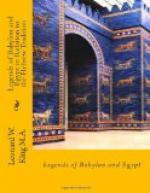(1) Col. V, ll.
7-11 are here compared with Gilg. Epic, XI,
ll. 133-9.
SUMERIAN VERSION SEMITIC VERSION
When I looked at the storm, the uproar had ceased, And all mankind was turned into clay; In place of fields there was a swamp. Ziusudu opened the opening of I opened the opening (lit. the great boat; “hole"), and daylight fell upon my countenance. The light of the hero, the Sun- god, (he) causes to enter into the interior(?) of the great boat. Ziusudu, the king, Bows himself down before the I bowed myself down and sat down Sun-god; weeping; The king sacrifices an ox, a Over my countenance flowed my sheep he slaughters(?). tears. I gazed upon the quarters (of the world)—all(?) was sea.
It will be seen that in the Semitic Version the beams of the Sun-god have been reduced to “daylight”, and Ziusudu’s act of worship has become merely prostration in token of grief.
Both in the Gilgamesh Epic and in Berossus the sacrifice offered by the Deluge hero to the gods follows the episode of the birds, and it takes place on the top of the mountain after the landing from the vessel. It is hardly probable that two sacrifices were recounted in the Sumerian Version, one to the Sun-god in the boat and another on the mountain after landing; and if we are right in identifying Ziusudu’s recorded sacrifice with that of Ut-napishtim and Xisuthros, it would seem that, according to the Sumerian Version, no birds were sent out to test the abatement of the waters. This conclusion cannot be regarded as quite certain, inasmuch as the greater part of the Fifth Column is waning. We have, moreover, already seen reason to believe that the account on our tablet is epitomized, and that consequently the omission of any episode from our text does not necessarily imply its absence from the original Sumerian Version which it follows. But here at least it is clear that nothing can have been omitted between the opening of the light-hole and the sacrifice, for the one act is the natural sequence of the other. On the whole it seems preferable to assume that we have recovered a simpler form of the story.
As the storm itself is described in a few phrases, so the cessation of the flood may have been dismissed with equal brevity; the gradual abatement of the waters, as attested by the dove, the swallow, and the raven, may well be due to later elaboration or to combination with some variant account. Under its amended form the narrative leads naturally up to the landing on the mountain and the sacrifice of thanksgiving to the gods. In the Sumerian Version, on the other hand, Ziusudu regards himself as saved when he sees the Sun shining; he needs no further tests to assure himself that the danger is over, and his sacrifice too is one of gratitude for his escape. The disappearance of the Sun-god from the Semitic Version was thus a




